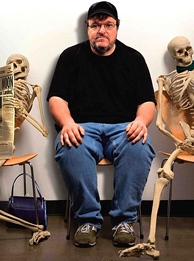Figaro tells how to make admissions officers fall in love with you.
As someone who writes a lot about persuasion, I frequently get asked by high school juniors and their parents how to write a successful college essay. My own son, George, sought my advice, and he was glad he did. His essay about a headache (yes, a headache), helped get him into his highly selective first-choice school, Middlebury College. His work was among 10 (out of a class of 850) read in front of the campus at Convocation. “The one they read before mine was by a Palestinian who wrote about shielding his little brother as an Israeli bomb hit their house,” George told me later. “‘Oh, great,’ I thought. ‘Now they’re going to read about my headache.’”
It did the job, though. George wrote the essay himself, but he followed my advice. Here’s what I told him, and what I tell everyone who asks me.
1. What’s your hook?
While the top schools look for good writing, they’re more interested in character. Your Board scores will tell them how smart you are, and your grades let them know you study hard. Admissions officers also look for a student who will add something to the campus. Ask them about the most recent crop of first-year students, and you’ll see what I mean: “Our class includes a published novelist, an Olympic luger, and an artist who made a monumental sculpture out of Gummi Bears.” That’s what I mean by “hook.”
Don’t stress out if you don’t really have one. (Remember George’s headache?) But it helps. My friend Alex, who’s about to enter her senior year in high school, has a second-degree black belt in judo. She was thinking about doing an essay on her beloved “Calvin & Hobbes.” Can you guess what my advice was? If you have a hook, write about the hook.
2. Don’t express yourself.
A college essay is an act of persuasion. Your job is to talk the admissions office into accepting you. So the essay isn’t your opportunity to get feelings off your chest, or amuse yourself, or imitate your favorite writer. Your teachers have spent far too much time telling you to express yourself. To persuade someone, you should express your reader’s thoughts and desires, and show how you embody them. Think: If you were an admissions officer, what would you be looking for in, say, you? Oh, and another thing:
3. Relieve their boredom.
Admissions officers read thousands of essays every year. Yours doesn’t have to be the most creative; it just has to be a good read. And how do you write such a marvel? By telling a story.
4. A winning essay isn’t an essay.
I probably sound like a Zen master here (The essay must write itself, Grasshopper), but my point is pretty simple: the college essay is mislabeled. It’s really a story. It should have a main character (you, presumably), a setting, some sort of conflict, and suspense.
George wrote about how he developed Chronic Headache Syndrome at the beginning of seventh grade, when the family moved from New Mexico to an urban high school in Connecticut. The syndrome is triggered by a virus, and in a type-A person it creates a sort of negative feedback loop: the headache causes stress, which makes the headache worse. George’s mother and I took him from one doctor to another. All of them prescribed drugs that would have turned him into a zombie. Finally, we found a psychiatrist who was an expert in biofeedback techniques. The doctor hooked George up to a machine that measured his brain waves. It had a monitor that showed an array of red bars.
“If you relax your brain,” the doc said, “you create Alpha waves that will help make your headache go away. If you can turn all the bars green, I’ll give you a prize.” Being the goal-oriented type, George sits down at the machine and PUSHES his brain. “UUUUGGGGH!” He’ll make those bars turn green. ((Note how I switched to the present tense. It makes the story seem more immediate. If you think you can handle this tricky tense, consider using it for your essay.)
As George stares at the red bars, he thinks about himself—about the 50-something merit badges he earned on his way to becoming an Eagle Scout, about his love of competitive Nordic skiing, how he climbed the 48 tallest peak in New Hampshire before he turned 10, about how his whole identity has to do with meeting goals. But he comes to realize that the single-minded pursuit of things doesn’t always get you what you want.
Still the bars won’t turn green. He realizes he has to do more than just relax: he must allow himself to trust that some things work themselves out on their own. “Is this what faith is?” he asks. And then comes the last line in his essay: “All the bars turn green.”
That essay had all the elements of a story: a character, a conflict (type-A kid struggling against his type-A’ness in type-A fashion), suspense (will he make his headache go away?), and an epiphany (the nature of faith). He told the story with grace and humor, revealing just the kind of intelligent, maturing soul admissions officers love. (Hey, cut me some slack. I’m his dad.)
5. It’s all about epiphany.
Admissions people look for students who learn and grow, so your essay should show you learning and growing. Whether you write about your hook or your headache, don’t just brag or describe. Your essay should have a moment of revelation: what did you learn from your experience? How did it make you the thoughtful, sensitive, brave, strong person you are (or would like an admissions person to think you are) today? Show a process of learning, and a moment of revelation.
6. Make yourself good and miserable.
George did more than 30 drafts, spending a summer writing whenever he wasn’t working at his job or hiking outdoors. It was one of the hardest things he’d ever done, and it made him miserable. In other words, he felt just like a writer! With any luck, he’ll avoid following in his dad’s footsteps (I’m a writer) and go on to earn an honest living. Maybe he’ll advise students on their college essays, grow rich, and support me in my dotage. And to think a college essay started it all.
Figaro is the author of the popular rhetoric blog, Figarospeech, and author of the bestselling Thank You for Arguing: What Aristotle, Lincoln and Homer Simpson Can Teach Us About the Art of Persuasion. He worked at Dartmouth College for ten years as an administrator—not in the admissions office, but he saw the process up close.
 Wednesday, August 15, 2007 at 02:14PM
Wednesday, August 15, 2007 at 02:14PM  Quote: “I realize that some of the Democrats are Captain Ahab and I’m the great white whale.” Karl Rove
Quote: “I realize that some of the Democrats are Captain Ahab and I’m the great white whale.” Karl Rove



